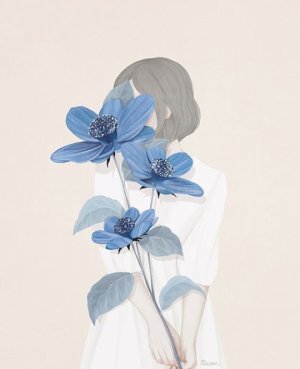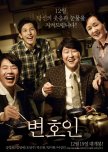
This film is one of 2013’s most critically acclaimed films domestically and that doesn’t surprise me a bit. You see, The Attorney is based on the real-life story of the ex-president Roh Moo Hyun’s early years, when he used to be an attorney and human rights activist. It also takes a controversial case from 1981 as its main focus. This film is neither a legal thriller nor a courtroom drama. It doesn’t focus on a desperate attorney trying to win a case or someone trying to prove his innocence; it’s more like a serious depiction of the social and political status in South Korea back in the days. Something low-keyed but contains greater value.
The emotions and reactions throughout the film were quite penetrating. You’ve got to give director Yang Woo Seok credit for what he did with the storytelling, he didn’t only direct this film but he also wrote it himself creating a respectable piece. He didn’t use anything that’s high-profiled because basic elements and some emotions-play were more than enough to deliver great developments and captivating events.
Without doubt, no one can deny Song Kang Ho’s astonishing acting skills, he’s able to grab any character and make you feel it throughout. It was impressive how he delivered Song’s character, every emotion and every facial expression were too involving. It’s not for naught that Kang Ho ahjussi is one of the fewest critically acclaimed actors in and outside South Korea. The rest of the cast delivered so well, the director knew how to pick his actors because a little exaggerated acting would’ve blown everything into thin air but gladly, none of that happened here.
Considering the fact that this film was set in the late 70’s and the beginning of the 80’s, the cinematography felt fitting but not more than the music, it had an important part to make you connect to the characters and events.
Watch this if:
-You like films that are based on true-life events and characters.
-You like to watch an interesting film about politics in South Korea 30 years ago.
-You like Song Kang Ho; this is one of his better performances.
Do not watch if:
-You’re not into romance-free films with somewhat slow development.
-You’re looking for something light or thriller-like.
The Attorney is an interesting film that concentrates on political and social issues in South Korea back in the 80’s. It’s absolutely a success for the newbie director Yang Woo Seok and a wonderful introduction to follow his work in the future.
Was this review helpful to you?

So what is this about? It’s a story about “Benri-ya” which literally means “handy men”. The two main leads are given certain jobs to accomplish and they get involved in various adventures through their clients’ requests. It’s a concept that’s not very unique since I am sure that many of you saw dramas where the main leads are “problems-solvers” where they get into contact with many characters and go through various situations to achieve their missions.
However, what shines in that episodic pattern is that our main leads don’t get involved in their clients’ lives to be sacred savers, heroes or creators of happy ever after endings. Even the side characters are Mahoro’s ordinary people and job requests don’t demand anything heroic to pull through. In this drama, the situations are handled quite realistically than any other non-detective episodic drama I saw, it deals with some of the life’s dark cases such as prostitution, stalking, AV’s, Yakuza, alcoholics, etc. I was actually surprised in a good way with its pattern.
Another point that attracted me about this drama’s screenwriting is the great slices of humor; I always appreciated Japanese style of comedy and silly hilarious situations so during this drama, I always had to pause and laugh out loud for a while.
The acting is realistic and very believable; I wouldn’t choose any other actors over Eita and Matsuda Ryuhei for the main roles; they did great jobs with their characters’ portrayal. Even guest actors delivered good performance although I am not familiar with half of them.
The characterization is top-notch. As a stated above, the main characters in this drama aren’t sacred saviors; they’re actually anti-heroes without dreams, ambitions, a real life or even families and friends. In short, they have nothing so they need to take job requests that allow them to eat meals even if many of them are hard to accept. Although Tada is a straight gentle character, Gyôten is a real slacker who’s always hanging around in pajamas pissing Tada off just for fun. He’s also a rudely honest character who throws his words without counting the consequences but everything he says is practically pure joy and he always make me laugh whether it’s the way he runs, the way he talks or the way he imitate zombies. That guy is surely going to get a spot in my “favorite characters list”.
The music managed to catch my intention although I don’t really focus on drama’s music but the “Happy Janai, Lucky Janai” and “Matomo ga Wakaranai” songs were really enjoyable and perfectly suited for this drama’s theme.
Watch this drama if:
-You like Japanese style of comedy.
-You like to watch light-hearted drama with great life-like situations.
-You like Eita, Matsuda Ryuhei or both.
Do not watch if:
-You dislike Japanese silly sense of humor. I know that many people don’t appreciate it.
-You dislike Matsuda Ryuhei.
To make the long story short, Mahoro Ekimae Bangaichi is an enjoyable piece of Japanese humor with greatly chosen life-like situations and realistic acting skills that deserves to be watched by the fans of this genre. It’s definitely one of the best dramas made this year.
Was this review helpful to you?
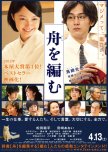
The film main point is making a dictionary titled “The Great Passage”, like the chief-editor stated: “A dictionary is a ship which crosses the sea of words and languages”. Being a lover of dictionaries and words in general, I am ashamed to admit that I was ignorant of the hardships and the overwhelming mission of making a dictionary that may take more than a decade to accomplish. Therefore, this film was such a penetrating telling of an intriguing theme.
While watching The Great Passage, you will be stroked by two things: the story’s process and the characters’ portrayals and interactions. The first part is a quite slow narration of events that may not sound impressive at first sight. However, with the film progressing; many parts start to connect and the plot becomes as solid as ever. Moreover, light moments were also used to add some entertainment such as the editors eavesdropping on young girls’ conversation to find out new words invented by the younger generations. Although, this film may not be to everyone’s liking because of the theme and the very slow events’ development but I believe that was the perfect way of making such a film.
The second part is what makes the film quite special too; this film’s characterization was carefully handled to not appear surreal or lacking. For instance, the male lead Majime (literally translated as “serious”) was a quiet man who finds trouble with expressing himself; he’s always surrounded by books and has zero friends and thus no social abilities. The only one who’s able to understand him a little is his landlady. When such a man gets the chance to make a dictionary, he was inspired and determined to make it his life goal. In the meantime, he falls in love and starts struggling to win his lady’s heart, despite his lack of self-expression, while continuing his dream of making the dictionary come to life.
On the other hand there are his co-workers at the dictionary department; his fellows in this enormous mission of defining, refining and editing thousands of words in a modern-day dictionary. All of his colleagues were quite endearing but the most captivating character must’ve been Nishioka; an entirely opposite character of Majime; talkative, social and very affectionate; he was Majime’s right hand because dictionaries can’t be made by bookworms alone.
The acting was powerful. Matsuda Ryuhei is a very talented and versatile actor; I’ve got the chance to see him in five different roles so far and I loved him in all of those but this must be where I become a great fan of his acting style: expressive, calm but turns intense in need. His portrayal of Majime’s was perfect; he involves you with his character at every facial expression. Other actors were also quite good in here especially Miyazaki Aoi and Odagiri Joe, one heck of an iconic Japanese actor.
The selected music for this film was very well synchronized with the film’s theme and developments. It adds a great taste to the watching experience. The cinematography was also pretty well conveyed considering the fact that this film contained many time jumps from the 1995 till 2010.
Watch if:
-You’re interested in different types of films.
-You like watching inspirational films.
-You like to learn more about dictionaries.
-You like watching high-profile acting.
Do not watch if:
-You can’t handle slow films.
-You’re looking for romance.
-You’re not interested in dictionaries or words.
-You find inspiring stories “boring”.
The Great Passage is a motivating film that handles a different topic. It’s certainly not for everyone but if you can handle it then it’s undoubtedly one of those hidden gems that leave you with a smile on your face.
Was this review helpful to you?
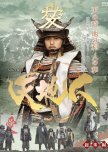
I am actually surprised at myself for not picking a taiga drama before even if I am a hardcore fan of history; I watched historical films but never a taiga drama. I think I was scared away by the length considering my low patience level but after starting this drama, that factor didn’t matter anymore.
Before I review this drama, let me first explain what taiga dramas mean. They’re Japanese yearlong historical dramas produced by NHK and each taiga takes a specific historical character to tell his life with 98% of accuracy. Unlike most of Korean Sageuk that tend to take a little part of history and built a completely inexistent story on it, taiga dramas tend to tell the history in the most believable accurate way ever. Of course there are some dramatic effects but they never sabotage history or add imaginary characters on their own. And don’t worry, they tend to explain everything whether at the beginning or in their “Travelogue” at the end so you won’t feel lost at all even if you’re not familiar with history.
Tenchijin is set during the late 16th century: The warring era which marks the most chaotic period in Japanese history where all the daimyo (clans’ lords) were fighting for the rule and power. That era happens to be my favorite fraction of the Japanese history because many of my favorite generals belong to that period. And while I previously know every single thing about the era and the destiny of its characters including my favorite names, it still felt so fresh and amazing to watch the characters I read about being alive.
During the chaotic era of schemes, betrayals and greedy intentions, NHK decided to pick the Uesgi and center their 48th taiga drama on them. For anyone who knows history, the Uesgi aren’t actually the type who ruled Japan or searched for personal gain. They have a mystical aura around them ever since the lord Kenshin’s days. It’s all about the justice for the Uesgi and Kagekatsu (Kenshin’s adopted son) followed his lord’s path of justice by the great help of this drama’s main character Kanegatsu. This storytelling is about the calm, patient, non-greedy, loyal and righteous vassal who lived his life serving the Uesgi, caring for the commoners and creating a distinguished name for himself. Kanegatsu may not have been famous like many generals of the warring era who gained popularity even in current days but he was respected and acknowledged by most of them for his thoughtful thinking and great techniques. He may not have been a great warlord but he was one of the best strategists of the era and one of the fewest who genuinely cared for farmers and the poor.
While telling the story of Kanegatsu, this drama had to center the light on many other characters and events of the era like the ever popular generals: Kenshin, Oda Nobunaga, Saru Hideyoshi, Ishida Mitsunari, Tokugawa Leyasu, Sanada Yukimora, Date Masamune, Maeda Toshie, etc. Those plot changes were quite alluring because they introduced the important figures of the era, their interactions with Kanetsugu and their thoughts about the country’s future. The main character’s meeting with those famous generals added a different taste to this drama. While some of them were his allies, others were his enemies. Considering Kanetsugu’s sense of justice and great talkative manner, you will be looking forward to how he will reply to their compliments or repay their harsh comments.
There are a lot of political clashes in this drama between daimyo lords, the rulers, the vassals and even the wives. However, this drama isn’t all about politics. It contains amazing friendship moments, some romance, heartwarming relationships and great bromance. It will always manage to keep you interested.
It’s a given that you cannot produce a great taiga drama or any historical telling without great actors who know how to make characters feel alive and this drama’s casting nailed it in that part. Tsumabuki Satoshi being the male lead for this drama was one of the main reasons why I chose it as my first taiga and no, it’s not because of fangirling reasons. That man is one of the best Japanese actors nowadays and what’s better than a taiga main role to make him even a better actor? He delivered so well, whether in the foolish, serious or heartwarming moments because that’s what his intensity is all about. What also made the acting department even more overwhelming is the presence of other astounding actors such as Abe Hiroshi, Oguri Shun, Matsuda Ryohei, Kitamura Kazuki, the veteran Utsui Ken and many others that made great scenes and awesome portrayals of the generals. There were some astonishing duets with Satoshi in many scenes.
In a line, I will mention that some battles weren’t portrayed in a good way but the cinematography and the soundtracks were quite fitting for the theme.
Watch this if:
-You love history and want to know more about the Japanese warring era.
-If you like accuracy because taiga dramas have the most informative plots ever.
-If you want to discover taiga dramas but beware that they’re nothing like sageuk.
-If you like the set of cast especially Satoshi because he was amazing in this.
Do not watch if:
-You dislike anything historical.
-You’re not a fan of the Japanese warring era.
-You dislike any of the cast.
Tenchijin is a wonderful ride through the warring period which marks the most interesting part of the Japanese history. The drama takes the life of Kanetsugu as a reference to the Uesgi clan to tell his struggles and deeds through the chaotic era to reach the peace era.
Was this review helpful to you?
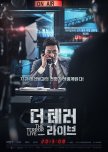
This review may contain spoilers
If I have to describe the Terror Live in one sentence I would say: One room, an anchor, a terrorist, a live broadcast and lots of thrills.I have been waiting for this ever since it first came out and I can say that I am quite satisfied. The story of this film is located in one room, the radio station, this may seem so little for a thriller to happen but I take that as a positive point because the non-diversity of locations forced the focus on the plot and dialogues instead which is a great thing. The Terror Live builds a great tension and thrilling moments that it may even feel suffocating in a good way.
The film starts out very fast without the meaningless time-filler introductions; it was engaging ever since the first minutes and it kept drawing the attention until the very end. This film doesn’t contain any dull moment and you can never think that it became boring because the order of displaying events was quite well-done in a way that will make you anxious about what will happen next. Also, the messages delivered in this film concerning the government, mass media and terrorists as well as the questions it asks about their involvement are well-crafted. And no, this is nothing like any terror anything you’ve seen before since it doesn’t follow a stereotypical pattern at all.
The acting was marvelous. Ha Jung Woo proves, once again, what great of an actor he is. I always praise him in my reviews not because I am biased with him as a fan girl (although I do find him quite charming) but it’s due to his absorbing acting skills that keep getting better and better after each film he makes. And man does thriller roles suit him so well! I am complimenting the acting because if some pretty face idol who doesn’t know how to act did this type of role then everything would have went downhill that’s why choosing great actors is one the most important elements of making a successful film.
The characters were intriguing and very well-done as a whole. There’s no hero in this film because our male lead is almost an anti-hero instead of the opposite side. The anchor had the greatest character developments ever where he started as a sloppy carefree radio host then he became a serious anchor and at the end…Well, it’s a spoiler.
The cinematography is catching and pretty similar to recent Korean thrillers visuals with only little CGI used in the process. And I don’t think a second rewatch of a tight suspense film is a good idea.
Watch if:
-You’re in the mood for a great suspense thriller.
-You like the Korean way of making thrillers.
-You like Ha Jung Woo or want to discover him.
Do not watch if:
-You dislike thrillers and suspenseful stories.
The Terror Live is one of the better Korean thrillers made in recent years, if you want to watch this film then make sure to prepare yourself for an astounding ride.
Was this review helpful to you?
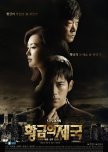
Golden Empire is simply gold but that gold isn’t for everyone to watch and I can fully understand why the audience would avoid a business/romance-free drama. Has it been a time when you were watching an excellent drama but you find out that most people are ignoring it and the internet buzz is almost inexistent? That’s my case with Empire of Gold.
If you want to watch this, forget about the synopsis; it’s misleading and makes you expect things you shouldn’t. This is a story about power struggle for 20 years in order to rule the golden empire which is Sung Jin Group that’s owned by the Choi family. The three main warriors are: Choi Seo Yeon; the daughter of Choi Dung Sung who’s the owner of the group, her cousin Choi Min Jae; the son of Choi Dung Jin who’s the co-founder of the group and Jang Tae Joo who built himself from scratch and came to win the Empire of gold.
Out of all currently airing Korean dramas I was watching synchronously with Golden Empire; this one managed to to snatch the top spot and remain as my top obsession all the way through; this drama excels in screenwriting and witty dialogues, this is a drama where billions were flying on the dining table and a cup of tea can decide someone’s destiny: Yes, I had to mention that because once the table is set for a cup of tea, you should know that you will be blown away by the characters’ dialogue. What I like the most about their dialogues are the metaphors, the quotes and the historical events that they use to deliver their ideas whether directly or indirectly that’s why I always thought that this drama’s writers are geniuses; not only they wrote amusing discussions but they also provided us intense thrilling events and intriguing twists without any drop of slow moments that can reduce our intention: loud claps for the most brilliant writers in Kdrama's history.
The acting department was simultaneously stunning; Go Soo, Lee Yo Won and Son Hyun Joo are astonishing actors that I can’t imagine this drama without them. Jang Tae Joo, Choi Seo Yeon and Choi Min Jae are equally alluring, smart and impressive; just get ready to cheer for them, hate them, love them, distrust them, pity them, curse them but the most important thing is that you will feel them. They led this drama and made the excitement within its storyline through the alliances, the schemes and the conspiracies that were masterminded by those three or the rest of the cast who were equally convincing as actors and highly appreciated as characters.
In a line, I want to give credit for the music that suited this drama’s business theme in a magnificent way.
The rewatch value is low because such an intense drama will lose its twists and the factor of surprise if it's rewatched.
To make the long story short; this drama isn’t directed for everyone but one thing’s for sure, it’s unlike other same-plot dramas since there are no cheesy moments, weak characters or shallow acting. This is a high class screenwriting that’s very rare to find in Korean or Asian dramas in general.
Was this review helpful to you?
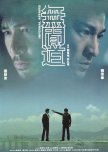
It’s true that the American version has better visuals because…duh, it was produced four years after Infernal Affairs but the original remains the best. Anyhow, I am not here to compare both versions; let’s talk about this movie.
Infernal Affairs is about the underground world, the triads and the moles. This is probably the best undercover story ever written; the developments created a race against time to reveal the moles within the gang and the police. This is a fast paced rollercoaster ride with many twists and turns that will keep you at the edge of your seat. The suspense element was flawless but the mystery built up was somehow lacking that’s why the storyline didn’t manage to get the perfect score.
Like any other action movie, this one contains violence and brutal killing sometimes but I wouldn’t categorize it as a violent movie. This is basically a thriller-crime mixed up with well-made suspense with the undercover theme as its center.
The acting was quite remarkable, with Tony Leung and Andy Lau as main leads you’re bound to expect something with quality and they surely didn’t disappoint. They were both great in portraying their role and delivering feelings; nothing less from two of the best actors in HKC productions. Other actors like Anthony Wong and Eric Tsang were also quite good and pretty convincing.
This movie’s characterization was the major strength point beside the clever writing of course. I wouldn’t be exaggerating if I say that all characters will be able to to get your full intention whether they were the good guys or the villains. The writers succeeded in creating top-notch characters’ development that will make you relate with each and every one of them.
The music was fitting for a suspense thriller movie; I also liked the “Shi Shey” song that was played in the background, it was really calming.
Watch this if:
-You’re looking for good suspense thriller with unexpected twists and turns.
- You’re fond of undercover themed stories.
- You’re in the mood for good screenwriting and compelling storyline.
- You like Andy Lau, Tony Leung or both them. This shouldn’t be missed for both of their fans.
Do not expect:
-Happy ever after ending.
- Romance.
All in all, this movie is wonderfully made since it can draw you into the world of darkness and make you strongly attached to its characters and events. If you like the genres, I can guarantee that this movie will manage to move you one way or another.
Was this review helpful to you?
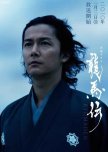
For starters, let me mention the difficulty to assemble my thoughts about such a wonderful drama. It took me a while to know where to start but let’s begin with this: Making a Taiga about one of Japan’s most influential figures was such an astonishing idea! Once again, let me insist on the accuracy of Taiga’s, they abide to historical facts with only few minor changes that can never cause the deviation of the historical flow. There is also the very informative “Travelogue” at the end of each episode to nourish your historical knowledge on some characters with the addition of real places to visit in Japan (when my long dream of visiting Japan comes true, I will go there for sure!).
Ryoma didn’t live much but through his short life, he did many unforgettable deeds for Japan and its people. Being born as a Tosa’s Kashi (Low Samurai rank), he wasn’t handcuffed by the daimyo rules or the common traditions. Instead, he had dreamy ideas to change his country to what Japan became like in our recent days. The Bakumatsu era aka the end of the Tokugawa Shogunate was one of the most turbulent times in Japan’s recent history until the Meiji restoration came along. Our hero had to go through that period with many revolutionary thoughts in his mind. Ideas that were harshly rejected at times, hardly accepted at other times but very much acknowledged most of the time.
Ryoma character always intrigued me, being a low-class samurai who stood up for the well-being of all the people of Japan must be the main reason behind it. When the bakufu was ruling Japan for over 260 years with the same old fashioned thoughts, an air of change had to blow them up and make them realize that the world is moving on and so should they. That air was Sakamoto Ryoma, through his adventures he was able to gather the essence of Japan’s future in a new world. It’s a world where they can be amongst the leading countries instead of falling into the merciless claws of imperialism.
Ryoma’s life had many turns and countless of encounters. It started with his family, his childhood play-pals, going through his first love, his idols in life, his allies, his enemies, his teachers, his women meetings and all of his comrades. Sakamoto Ryoma always managed to leave a deep impression into anyone he met, whether they loved him, hated him or even those who wanted to kill him. I think Ryoma’s most note-worthy quality was his ability to negotiate and convince the other party of the legitimacy of his views; he does that with perfection even against the most fearsome and huge figures of his time. Many believed in him and countless supported him as he embarked his journey towards a bright future and that didn’t come from naught, Ryoma was able to capture them one way or another.
Turbulent times are full of political clashes and endless battles but that made the drama even more exciting. Every detail of the Japanese history at the time was inserted in the most captivating way. Our narrator Yataro played by Kagawa Teruyuki added more attractiveness to the events. His historical tone while telling Ryoma’s life was priceless; one of the best narrations I ever came across in any Asian drama!
Now if I have to state my little displeasure about this drama it would be the over-idolizing of Ryoma’s character. I know about that because I actually read a lot about Sakamoto Ryoma and Japan’s history prior watching this drama and his character isn’t as perfect as the drama describes it to be. I know that they want to honour a Japanese hero and a little dramatization is no escape to make an appealing drama but I felt uneasy about those parts, even a little.
When we talk about Taiga dramas, we need to pay extra attention to acting considering its crucial role in maintaining ground-breaking historical telling. Fukuyama Masaharu nailed it so bad as Sakamoto Ryoma, he was able to make the character feel pretty much alive. He once stated about playing Ryoma’s character: “His appeal stems from being the kind of person onto whom anyone can project themselves”; that explains it all.
The supporting cast was full of many incredible talents such as Omori, Tanihara, Iseya, Takahashi, Aoi, Kiritani, Oizomi, Takito, Oikawa, Maki, Kamikawa, Sato, Kaname and many others. They were able to maintain a very intriguing historical tone throughout the whole drama. It’s no secret that Taiga and historical dramas overall are what make you test an actor’s skills and this drama’s cast gave wonderful credits to the characters they played. However, the best of them all was Kagawa as Yataro, no wonder he got many awards for that role; he was able to flawlessly play the role of Ryoma’s lifelong friend with all of their complex relationship, it takes an actor from a high calibre to pull that off. He undisputedly managed to steal the lights from Fukuyama countless of times.
The cinematography was pretty well illustrated with all of those charming sceneries in old-times Edo, Tosa and Kyo. I was pretty immersed in the realistic depiction of the historical setting and the soundtrack used in this drama. However, I was displeased with the camerawork. Directing has been the major issue with Taiga dramas. Although it can be disregarded since this is a drama not a film but I still hope this can be changed.
Watch if:
-You like historically accurate dramas.
-You like NHK Taiga dramas.
-You want to watch a drama about one of Japan’s most important figures.
-You like political oriented dramas.
-You want to discover Taiga dramas.
Don’t watch if:
-You don’t appreciate historical Japanese dramas.
Ryoma Den left me with many great thoughts about Ryoma’s character even with the little differences compared to history. My second NHK Taiga adventure was a total success and now I am thirsty for more!
Was this review helpful to you?
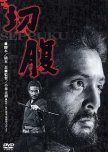
This review will probably be my longest up to date. Bear with me because I have to put this film in its right temporal and spatial frameworks before talking about the film itself. If you’re not interested in history, you can skip the first two paragraphs and get to the film’s specific review.
I am history lover so it’s a given that I studied Japanese history way before I started watching Japanese classics and that knowledge in history helped me a lot when I started exploring the golden Japanese cinema. Seppuku is set at the beginning of the Edo era (17th century), an age of peace that lasted for more than 250 years in Japan where the Samurai class gradually lost the “warrior” side of their positions since there weren’t any wars to fight. As Tokugawa (the general who established his shogunate in Edo) gained complete control over Japan; many Samurai who fought the Sekigahara battle and others were left without clans to serve and were called “Ronin” meaning masterless Samurai. They were usually viewed as bandits whether intentionally or unintentionally, they lived in poverty but they didn’t lose their “samurai nobility” that’s still a higher rank than the peasants’ class. They also never gave up on their honorable ethics and beliefs.
In that era, many Ronin’s started to visit clans to request a “Seppuku” in their clans’ yard, meaning a ritual suicide where the Samurai has to literally disembowel himself using his Shinto (the Samurai in that era has a long Sword Katana and a smaller one Shinto that he always carry around with him, they’re considered as big part of his Samurai honor). The Harakiri (ritual suicide) is in fact an honorable death for a Samurai so it was dishonorable for clans to reject such a noble request from Ronins but they also didn’t want to let them kill themselves on their property so they either hired them as their clans’ Samurai (but that didn’t happen a lot since it’s an era of peace so the clans didn’t need many Samurai considering the fact that there’s no war) or they just gave them money and sent them away. As other Ronin heard about the story, they started to frequently visit clans in order to request a Seppuku but they never actually meant to kill themselves, they just wanted to take the money and leave. And that’s what’s called “Harakiri fraud” which is a cowardly, shameful act from a Samurai even if he’s a Ronin.
The history stops there although the clan that’s mentioned in this film (The Iyi clan) is a real clan that’s known as a very important figure in modern Japanese history. Now, let’s talk about the film itself; one clan (the Iyi clan) decided to stop these Harakiri frauds and made the Samurai who asked to commit seppuku kill himself so that other Ronin won’t dare show up in front of their clan. That’s how the story starts but through flashbacks, we get the overall story of that man, where he came from and why he came. His circumstances, his situation and his life were all told using flashbacks that were amazingly illustrated in order to produce spectacular turns of events.
Seppuku is a human Samurai film that deals with old Japanese codes of honor and ethical Samurai principles. Kobayashi wanted to introduce a somewhat anti-samurai film that deals with the shortcomings of some Samurai beliefs by using quotes such as “After all, this thing we call samurai honor is ultimately nothing but a façade” (said by Tsugumo Hanshiro) but then he comes back to insist on the codes of dignity. Unlike many Kurosawa films’ I saw where he always idolizes the Samurai figure. Don’t get me wrong, Kurosawa’s films are my favorites but what I meant to say is that Kobayashi and Kurosawa’s adaptations of Samurai stories are quite different even if they’re comparable, to each his own genius ideas of making masterpieces.
The film contained the sword fighting but it wasn’t the main focus of this film. The developments were surprising and quite intriguing to follow; in this film you get a taste of suspense, psychology, action, tragedy, revenge and even family. Although the film insists on the Samurai element more than anything else, it also focuses on family relationships, interactions and sacrifices as well as human and more specifically Samurai emotions.
If I keep talking then I won’t stop praising this film’s screenwriting by Shinobu Hashimoto and the original novel by Yasuhiko Takiguchi. I appreciated every angle of the story and the way it revealed facts at the most unexpected time. This is not a film that’s set to kill a Samurai through a ritual suicide or show the audience how a Samurai disembowel himself; it’s a film that describes the human emotions and feelings behind that act. However, I do understand if some people found the development a bit slow. As for me, my eyes were glued to the big screen the whole time without a single move or sound. Yes, it had that kind of impact on me.
The acting, oh my! what on earth can I say about that acting? I am not biased or someone who talks with full subjectivity so when I say that Nakadai was marvelous in this, I am not talking with a fangirl’s emotions, I am speaking with full objectivity about a Japanese legend. For me or anyone who knows classic Japan, Nakadai Tatsuya is a legendary star in the Japanese cinema and one hell of a charismatic astounding actor who can grab your intention in a split of a second. Like many of his other roles, Nakadai was amazing in this; his portrayal of Tsugumo Hanshiro’s character was flawless. Enough said or I won’t stop talking about that man’s incredible acting skills.
Other actors were also amazing; I was moved by their acting skills. It’s the golden Japanese era of cinema so it’s a given that only high-class acting exists. The characters were very well written and their relationships were fascinating to follow, I was moved by many characters’ developments in Seppuku.
Now let me talk about that breathtaking cinematography. I like to focus on cinematography while watching films and even though this was produced in 1962 (black and white); I was charmed by the back sceneries and great settings. Kobayachi did an awesome job with those mesmerizing takes that I will never forget.
I have to mention the soundtrack which I believe it’s the best music composure I ever heard in any Japanese classic.
Watch this if:
-You like Japanese classics or want to discover them.
-You enjoy Samurai films but keep in mind that this isn’t an action film.
-You love films with human stories.
-You like Masaki Kobayashi because this is his finest work.
-You like Nakadai Tatsuya because this is one of his best performances.
Do not watch if:
-You dislike Japanese classics.
-You dislike Samurai films.
To end my super long review, I will mention that Harakiri is a crafted masterpiece by Kobayashi and an eternal gem of the Japanese classic cinema that’s bound to take you through a great journey of amazing events and astonishing acting skills.
I will leave you with two quotes by Tsugumo Hanshiro:
“What befalls others today may be your own fate tomorrow.”
“The suspicious mind conjures its own demons.”
Was this review helpful to you?
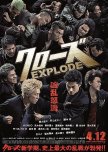
Being a fan of Miike’s filmmaking, it was unavoidable to miss the highlighted foolish characterization, extreme violence and hilarious black humour inserted everywhere. That being said, I never expected Toyoda to do the same. After all, two different directors have entirely dissimilar way of making their pictures. Crows Explode leaned to the realistic side way too much which was a bit wrong in my opinion; don’t get the wrong idea, immersing the characters and fighting scenes in realism didn’t sound like a bad treat but when it’s over-done with this type of film then things are bound to become bothersome.
To make things clear, this film had too many similarities with its famed prequels. The fight to become Suzuran’s top leader was still used as the main thread to drive the plot. However, the fighting sequences to reach that objective were surprisingly demure and repetitive in a worrisome way. Although Toyoda tried to focus on the human emotions between his characters, he didn’t exploit his main leads’ potential to the fullest. Thus, many feelings couldn’t get pass the screen barrier to reach the watcher’s heart.
Crows Explode narrative pattern was composed of several side stories that didn’t serve any meaning at times. At the matter of fact, few of them were just used to fill the running time instead of building characters’ back stories. To some extent, most of them were heavy to watch especially with the obvious lack of fighting scenes; they became utterly irrelevant to the film’s development. Let’s not forget the near-disappearance of black humour – which I clearly don’t blame Toyoda for it. The last fighting sequence wasn’t blowing but it delivered a nice punch after all.
The entirely different cast is worrisome, isn’t it? I know that many people can’t imagine the “Crows” without Oguri Shun and Yamada Takayuki on top of them. I am a big fan of those two actors myself but shockingly, their disappearance didn’t make me feel bad. I did want them to be in here but the new faces weren’t bad at all. Led by raising stars like Higashide and Yagira, the acting department did the trick for the lack of better words. Some actors didn’t convince me much but I can’t put all the blame on them, the way their characters’ were written didn’t allow them to show a wide range of emotions or action.
The cinematography was trying to be the same as the two Crows Zero but it didn’t come out that way, I believe the yellowish atmosphere is the film’s way of distinguishing itself from the others. The musical note was the same so there's nothing to complain about in that department. The directing style and the setting of fighting sequences are debatable but Toyoda made sure to leave his mark which is more than enough to respect a director.
Watch if:
-You like both Crows Zero but make sure to watch this with an open mind.
-You like school fighting.
Do not watch if:
-You’re looking for a “copy-paste” version of Takashi Miike’s prequels.
Crows Explode had its own touch of filmmaking but the serious realistic depiction that Toyoda decided to use didn’t come out entirely right, just like it wasn’t entirely wrong. Due to its entirely different pattern, this sequel should be viewed for its own merits, comparing it to Miike’s Crows will only make it harder to watch and judge.
Was this review helpful to you?
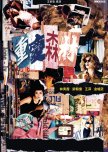
Since I am going through a massive rewatch mission of old Martial Arts films; I decided to include other old Hong Kong/Chinese films to the rewatch party as well and what’s better than Wong Kar Wai’s genius pieces? After seeing this film again, I can fully understand why I loved it the first time. The magic magnifies even after years of first viewing.
As everyone knows, I am not a romance person or someone who cares about the “moving cinema” at all and I can hardly watch an artistic film and completely appreciate it but all of that is in a world and Wong Kar Wai’s productions in another world. Kar Wai is one of the fewest directors that I look forward to watch their romance tales even if I am not a big fan of the genre. Do you know why? Because he’s a master who knows how to portray love with the intense power of silence to make it feel gripping. The man uses only few pages of script and the rest is told through magnificent ways, the rule in Kar Wai’s films is: everything that’s unspoken is stimulating and even what’s spoken is full of wisdom and hidden meanings.
I am surprised at people who say: “Kar Wai’s films don’t have a plot”, I mean are you sure we’re talking about the same director and films? I am a fan of Wong Kar Wai and his splendid of ways of making love stories because many need to understand that romance films shouldn’t always be: met, smiled, fell in love, kissed and Tada Happily ever after tale story just like they shouldn’t be: met, fell in love, disease, death and cries . Wong Kar Wai’s breaks those rules to create outstanding pieces.
Now, let me just stop here or I won’t be able to refrain myself from talking about that brilliant director.
There’s a story behind this film. Actually, Wong Kar Wai found a problem with editing his film “Ashes of Time” (that was releases the same year by the way) so he left it behind then wrote and directed Chung King Express in the meantime. The film is about coincidences, brief encounters, loneliness and painful love but that’s not what this film is all about, there’s also warmth and fun to enlighten the watch.
Chung King Express is divided into separate narratives about two policemen; the first is about the dark heartbreaking side of love led by Takeshi (who gained his breakthrough due to this film) and femme fatale; the inside-conversation he had were simply intriguing in a way that would make you completely understand the character and its suffering. The second story outclasses the first if I may say. It’s not only because it’s less dark or because it had more run-time but also because it takes on other interesting turns. It’s about Tony who suffers the problems of post-breakup until a cheerful soul came along.
The acting was good and the characters were quite fitting for the storytelling. Takeshi still didn’t gain much experience while doing this film so Tony and his female lead merit more credit.
As usual, Kar Wai’s camerawork was amazingly done and the cinematography was quite alluring for the film’s theme. And let’s not forget ‘California Dreaming’ that was a great choice of theme music.
Watch this if:
-You like Wong Kar Wai’s films or you want to meet his work.
-You appreciate different types of love stories.
-You like artistic love films.
Do not watch if:
-You think Kar Wai films “don’t have a plot”.
-You dislike any of the cast.
Chung King Express is a stylish storytelling of love tales orchestrated by the excellent love stories’ director Wong Kar Wai with a notable set of cast.
Was this review helpful to you?
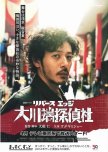
Being in TV Tokyo’s midnight slot is absolutely one of the reasons that made this drama appealing in its own way. That timeslot always witnesses some pretty cool dramas that usually go unnoticed – unfortunately. Even though this drama follows the usual episodic pattern, it managed to deviate its investigation procedure from an episode to another. It always managed to draw attention to every guest’s issue.
The cases in this drama aren’t mind-boggling or deep. They’re usually simple cases about finding people or looking them up, it may sound boring at first sight but everything becomes different when darkness sneaks in many of those cases. Sometimes, a certain case leaves a deep impression and confusion that’s beyond description. I believe that’s what differentiates this drama from its fellow Japanese detective production; it seeks depth instead of solving a case then getting over with it. There’s absolutely no drop cheesiness and happy-ever after clichés in this drama. However, it’s true that not all 12 cases were interesting.
The cast was pretty well fitting. Odagiri Joe as the main lead was such a master stroke. I am not only saying that because he’s one of my favourite actors but this type of role suits him very well. You can clearly see the actor’s traits through his performance: lazy, calm and with a mysterious charismatic vibe. The other two main characters were in a great harmony with our main lead; an old man who’s supposedly in charge and a sexy assistant to turn the detective agency into a welcoming place.
The majority of the guest characters left a good impression; of course some of them were stronger than the others but overall they were well-suited for the drama’s general atmosphere.
I became a fan of One Hitoshi’s screenwriting and directing style after last year’s great piece “Mahoro Ekimae Bangaishi” and now, I am even more impressed with him. He surely knows how to make a simple piece sound very special. Whether it’s the camera angles, the dark cinematography, the characterization or the choice of music; he did it all! I will have to stalk that screenwriter from now on. Although, I rarely care about directing in dramas but he totally made me interested in his style.
Watch if:
-You like different types of detective dramas.
-You like short dramas (27 minutes per episode).
-You like Odagiri Joe because he’s in top form here.
Do not watch if:
-You can’t handle episodic detective dramas.
Despite being simple, River’s Edge Okawabata Tanteisha managed to grow into a very special piece due to One Hitoshi’s irresistible style.
Was this review helpful to you?
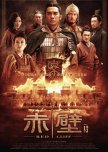
This review may contain spoilers
While the first part focused on the set up, characters and politics; the second part went straight to the battle itself. This film is made as a package so you simply can’t watch one and ignore the other. They’re strongly attached in a way that makes them feel inseparable.I will skip the history in this review, I wrote about it in the first part and any extra historical information that I give in this film would be considered a spoiler for those who aren’t familiar with history. But let me just make something clear, John Woo didn’t exactly follow history. He changed many events for the favor of his storytelling, so the outcome and some facts can be misleading for those who want to take this as an accurate “historical reference”.
Red Cliff 2 is all about war and everyone knows that everything is allowed in war; whether be it contaminating the enemy’s camp with deadly contagious diseases, using the enemy’s spies against them or burning down the Navy. That’s war, it’s ugly and everyone loses at the end, the deadly battles and the horrible truth are definitely there. However, that’s not all what war in John Woo’s film is all about. There’s more to tell through the splendid battle scenes.
The heart and soul of this film is the epic battle of the Red Cliff that marks one of the greatest wars in Asian history whether because of the number of soldiers involved or the smart distinguished generals who were leading armies. It’s 800,000 against 50,000; the first is led by the outrageous yet politically clever Cao Cao and the other is headed by the combination of Sun Quan and Liu Bei with the magnificent aid of the intelligent Zhuge Liang and Zhou Yu. The battle was all about tactics and strategists where the two advisors play an important role at confronting a huge army. The famous 36 Stratagems and 'Borrowing the arrows using the scarecrows' are one of the greatest psychological war techniques I ever read about in history and John Woo did an superb job by making them come to life.
The amazing strategies aren’t the only thing that clicked about this film; there’s also the astonishing portrayal of battles scenes, the blood spilling, the wonderfully made fire scenes and most of all the emotions and the reactions of characters’ involvements.
In this part, there’s no further explanation of actors; I already made everything clear about their amazing job in the first part. As for characters, I still insist on the over-use of the female characters, they weren’t only all over the place but they also were historically wrong.
The other characters’ developments were well-noticed between the first and the second part. We get to see more impressive sides of historical heroes especially Zhuge Liang and Zhou Yu.
This film’s cinematography was stunning. The visuals, colors and the sceneries were well-fitting for an remarkable piece of Chinese war epic.
Now, if I speak about the film as a whole; I would say it’s one of the best war strategy films ever made and absolutely one of John Woo’s better works. This is not a sequel; it’s a second half of the same film so you should understand that this is supposed to be watched as a whole. Do not see the American or the European cut versions; you should search for the original release of the two films or you won’t be able to feel the whole magic.
Watch this if:
-You saw the first Red Cliff because they’re inseparable.
-You like war films or John Woo’s HK works.
-You like strategy films.
Do not watch if:
-You’re expecting a historical documentary where everything is accurate.
-You do not like war films.
Red Cliff 2 is the second part of an amazing Chinese film that deals with the famous “Three Kingdoms” epic displaying the Red Cliff battle with all of its spectacular strategies and tactics.
Red Cliff as a whole is one of the better films’ that successfully demonstrated the art of war.
Was this review helpful to you?
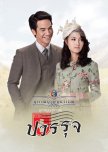
Khun Chai Pawornruj is the second part of the Suparburoot Jutathep series. It picks right where the first story left off. There were no flashbacks or explanations used; the viewer is immediately thrown into the second brother’s story and struggles. Unlike his four brothers who come from noble descendant, Chai Ruj’s mother was a servant for the first wife until his father raised her rank. So this inferiority complex followed him his entire life with the nickname “Khun Chai in the kitchen”. Although his brothers respect him and love him like an elder and a younger brother, some people outside aren’t of the same view.
Chai Ruj’s love story was in Switzerland with his childhood play-mate that he didn’t recognize. This was practically a travelling love story until the truth unfolds about the identity of his royal girl. The love story was a problem of ranks and some lies when Chai Ruj struggled so much to find love after his first heartbreak. Although he’s a diplomat for the Ministry of Foreign affairs, he was a proud man of his servant bloodline just like his noble side. Chai Ruj is a humble down-to-earth man, the kindest and the most caring between his brothers which made his character show a lot of interesting sides.
There are two reasons why this part managed to raise a little in rating; the first must be the diversity of side characters mainly the fellow travellers in Switzerland and their side love-stories that added a good balance. The second reason was once again, the bromance. The brothers stickled together for Chai Ruj especially Chai Yai (the elder brother) and Chai Pat who’s the closest to him, they showed a lot of caring and support for their second brother.
On the other hand, what this part lacked was the continuation of events; the annoying rejections, developments and some characters. For instance, Granny Oon overdid it with her meddlesome attitude. While the two Taewaporn girls were building that hateful tension which will come in Chai Pat and Chai Pee’s stories. I can obviously tell that Marathee is going to be that evil second female lead type in the upcoming story; I need to brace myself.
The acting was medium; Pope did well while his leading lady sucked so badly, she’s a pretty actress but her smiles, laughs and some attitudes appeared so awkwardly on screen. I know that’s she a newbie so I shouldn’t get too harsh on her but she was bad. The chemistry was good though.
Watch if:
-You liked the first part because this is absolutely better.
-You like travelling romances.
Do not watch if:
-You dislike the push and pulls in romantic stories.
-You’re looking for something impressive.
Khun Chai Pawornruj’s love story was certainly better than Chai Yai’s with little flaws here and there. It was enjoyable overall and I am too darn excited to see the doctor Chai Pat’s share of the series.
Was this review helpful to you?
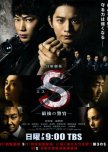
The drama is based on a manga that I haven’t read so I can’t compare but from the overview, I am sure this story can make a fine anime if that’s ever planned. I always said that Japanese tend to pick interesting and different plots for their dramas; this is definitely one of those intriguing topics that invade Japanese seasons each year. The plot may seem a little heavy due to some episodic procedures but it’s smartly written to overtake certain sensitivity against the episodic pattern.
S - Saigo no Keikan (aka S - The Last Policeman) is about Special Forces in the Japanese police organization and their way of handling terrorist attacks or situations. The main focus of the drama is NPS, a new special force that gathers the qualities of two older Special Forces SAT and SIT. NPS’s purpose is to secure criminals without killing them, that’s the main belief of the force, its members and our main lead. The operations’ build-up feels quite real although the final outcome can be fairly dramatized for the sake of emotions.
Despite being a straightforward action drama with lots of gun shooting and explosions, the drama’s main focus was the ethics and the feelings behind each case. It’s indisputably not brainless action for the sake of entertainment, it’s also not action games for the sake of thrills, military techniques or the suspense; it’s action for the sake of human emotions and relationships. It was an interesting take of the police, its higher-ups and the power struggle between Special Forces.
Acting wise, this drama’s producers knew how to choose their leads, supporting roles and even guest stars. Mukai Osamu and Ayano Go had a good chemistry as opposites in the same line of work. Although Ichigo’s character would sound a little cheesy with his over-concentration on not killing any criminal but he managed to keep the character interesting until the very last end. However, Ayano’s Soga was more penetrating with a cold character and a detailed back story. Another interesting character must be Odagiri Joe’s Masaki Keigo, the actor does crazy roles so well; I am glad I will be seeing lots of him this year. If we talk about acting then we shouldn’t forget the veteran Omori Nao and other cast members that delivered so well no matter how small the role was.
The action department was quite intriguing at times, even though shooting and bombs’ explosions weren’t present each episode but the Special Forces techniques and operations’ codes were believably made. The OST and cinematography were also pretty fitting for the drama.
Watch if:
-You’re looking for a good Japanese action drama.
-You like dramas that focus on special themes.
-You’re looking for a good casting line-up.
Do not watch if:
-You can’t stand the episodic pattern.
-You dislike the Japanese way of making action dramas.
-You’re looking for romance.
S - Saigo no Keikan is an entertaining drama with lots of action to keep you entertained mixed with dramatic moments to stimulate emotions. I will be impatiently waiting for the film!
Was this review helpful to you?

